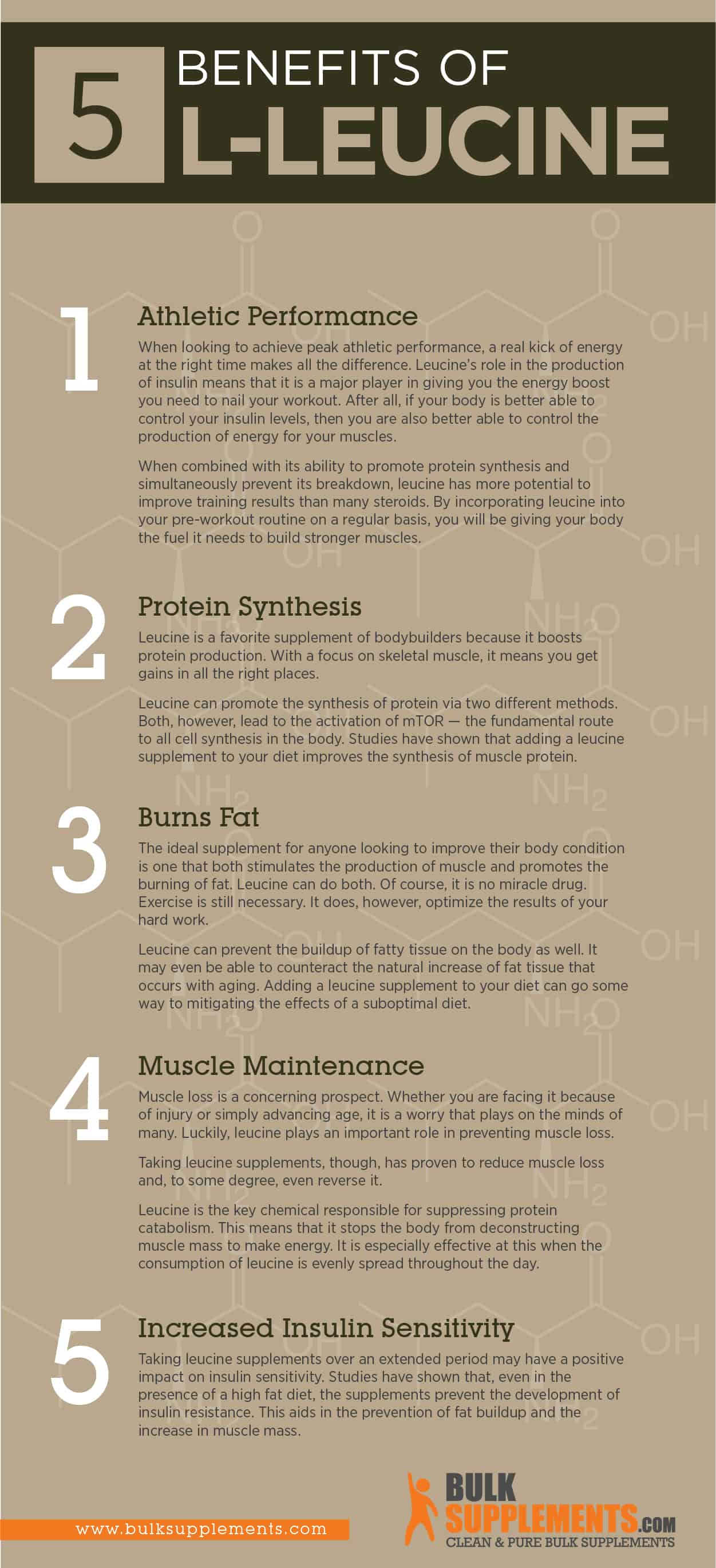Updated: 12/21/23
Have you ever felt frustrated by your lack of muscle growth? You’re diligently hitting the weights, pushing your body hard each workout. Yet no matter how consistent you are, the muscle gains seem to stall. You’ve heard of all the supplements that claim to accelerate muscle building, but you’re skeptical of empty promises. Well look no further, because L-leucine may hold the secret to efficiently fueling your muscles and maximizing growth. L-leucine is an amino acid that plays a unique role in stimulating muscle protein synthesis after exercise. In this post, I’ll dive into the science behind how L-leucine works, optimal dosing guidelines, and ways you can easily incorporate it into your routine for tangible results. Let’s get started with exploring how to achieve optimal muscle growth naturally – through understanding and applying the power of L-leucine.
What is L-Leucine?
L-leucine is an essential amino acid that the body cannot produce on its own, making it necessary to include it in your diet. It is in protein-rich foods such as meat, dairy, soybeans, and peanuts. This amino acid is important for building and maintaining muscle mass as it promotes muscle protein synthesis. L-leucine’s function helps signal the body to build new cells, such as muscle cells that repair and strengthen during recovery from exercise. As a result, L-leucine consumption helps enhance muscle protein synthesis, metabolic regulation, and growth hormone secretion.
L-leucine is also essential for maintaining a healthy metabolism. It is a branched-chain amino acid that plays a critical role in muscles, proteins, and enzymes that regulate energy metabolism. It promotes oxidation and metabolism of fatty acids, a process that is critical for energy production in endurance athletes. This essential amino acid helps maintain healthy blood sugar levels by enhancing insulin secretion, glucose uptake, and glycogen synthesis. L-leucine is crucial for reducing muscle breakdown while enhancing muscle growth and repair, making it an ideal supplement for bodybuilders and athletes.
When it comes to the history and culture of L-leucine, it has a rich heritage dating back to ancient Greece. The amino acid was named while deriving from the Greek word “leukos,” meaning white or clear. Its discovery dates back to the nineteenth century when scientists isolated it and characterized its chemical structure. Over the years, it has continued to be a popular ingredient in supplements, thanks to its impressive benefits for athletes and bodybuilders worldwide.
L-Leucine Benefits
May Help Improve Exercise Performance
It helps provide energy to your muscles and supports your body’s ability to sustain high-intensity exercise. It helps to delay muscle fatigue and increases endurance, allowing you to push through your workouts and perform at your best. Incorporating L-Leucine into your pre-workout routine can help improve exercise performance and enhance your overall fitness performance.
Promotes Muscle Growth and Repair
It is a powerhouse amino acid when it comes to building and preserving muscle mass. It supports muscle protein synthesis, stimulates the production of growth hormone, and helps your muscles repair and recover after exercise. This makes L-Leucine a must-have for anyone serious about bodybuilding and strength training.
May Improve Mood and Cognitive Performance
It shows to have a positive impact on mood and cognitive function. It helps to reduce stress levels, improve sleep quality, and enhance memory and focus. This makes L-Leucine a great supplement for anyone looking to improve their mental wellbeing and concentration.
May Boost Energy and Endurance
If you’re looking to increase your energy and endurance levels, it can help. L-Leucine is known for its ability to increase ATP production, which is your body’s primary source of energy during exercise. As a result, L-Leucine supplementation can help improve your stamina and endurance, allowing you to push through longer, more intense workouts.
Supports Weight Loss
It has been found to have a positive effect on weight loss by promoting fat burning and increasing metabolism. It also helps to reduce appetite and cravings, making it easier to stick to your weight loss goals. Incorporating L-Leucine into your weight loss program can give your body the added support it needs to shed those extra pounds.
May Aid in Wound Healing
It plays a crucial role in tissue repair and wound healing. It helps to promote the growth of new tissue and accelerates the healing process. This makes L-Leucine a helpful supplement for anyone recovering from injuries or surgeries.
May Increase Fat Loss
If you’re looking to lose weight or burn fat, it can be an important supplement to add to your routine. L-Leucine has been shown to increase fat oxidation, which is the process of converting fat into energy. This means that supplementing with L-Leucine can help your body burn more fat during workouts.
Supports Overall Health
It is not only beneficial for muscle growth and recovery, it also supports overall health. L-Leucine has been shown to help maintain healthy glucose levels, which is important for individuals with diabetes or insulin resistance. Additionally, L-Leucine supports healthy brain function and can improve cognitive performance.

L-Leucine Side Effects
Digestive Problems
Although it is generally considered safe, some individuals taking high doses of this supplement have reported digestive problems, including diarrhea, constipation, and abdominal cramps. To prevent or mitigate these side effects, it is a recommendation to start with a lower dose of L-Leucine and gradually increase it over time. You may also want to try taking L-Leucine with a meal or a protein shake to reduce digestive symptoms.
Kidney Damage
Another possible negative side effect is kidney damage. L-Leucine can increase the production of nitrogen in the body, which can put a strain on the kidneys, the organs responsible for filtering nitrogen out of the bloodstream. If you have kidney problems or a history of kidney disease, you should consult with a healthcare provider before taking L-Leucine.
Hypoglycemia
It can cause hypoglycemia, or low blood sugar levels, especially if taken in high doses. Hypoglycemia can cause symptoms such as dizziness, blurred vision, and confusion. If you have diabetes or low blood sugar levels, you should monitor your blood sugar levels regularly and talk to your doctor before taking L-Leucine.
Promote Muscle Hypertrophy
It is a powerful activator of a protein called mTOR, which is known to promote muscle hypertrophy and activate other metabolic pathways. However, excessive activation of mTOR can lead to insulin resistance, causing type 2 diabetes and metabolic syndromes. In addition, this high activation can lead to a decrease in white blood cells’ count, causing a weakened immune system. That’s why it’s a recommendation to follow the proper dosage.
Lower Levels of Serotonin
Another common negative side effect is lower levels of serotonin in the brain. It competes with tryptophan, another amino acid, for the same transporter molecule, decreasing the amount of tryptophan reaching the brain, reducing serotonin’s production. Serotonin is known to regulate mood, sleep, and appetite. So, if you notice any changes in your mood, sleep, or appetite, you may be experiencing serotonin deficiency. To prevent this symptom, try consuming natural sources of tryptophan, such as turkey breast, nuts, and seeds, along with L-Leucine supplementation.
Allergies
Some individuals may be allergic to it or other amino acids. If you experience swelling, itching, or difficulty breathing after taking L-Leucine, you should seek medical attention immediately.
Interference with other Medications
It can interact with some medications, including those used to treat high blood pressure, diabetes, and cholesterol. If you are taking any prescription medications, you should consult with a healthcare provider before taking L-Leucine to prevent any possible harmful interactions.
L-Leucine in BCAA
BCAAs are essential amino acids that our body cannot produce on its own, so we need to obtain them from the foods we eat. L-Leucine is one of the three BCAAs, along with L-Isoleucine and L-Valine. L-Leucine is special because it stimulates muscle protein synthesis and promotes muscle growth and repair better than any other amino acid. It is also responsible for preventing muscle breakdown and reducing muscle soreness post-workout.
L-Leucine is important for muscle growth because it activates a protein called mTOR (mammalian target of Rapamycin). mTOR plays a significant role in the initiation of muscle protein synthesis, which is the process of building new muscle tissue. Therefore, consuming enough L-Leucine in your diet can lead to significant muscle growth and recovery.
Moreover, L-Leucine helps to spare muscle glycogen, which is the storage form of carbohydrate in muscles. During high-intensity exercise, muscle glycogen is the primary energy source, and when your body runs out of glycogen, your performance drops. However, L-Leucine helps to preserve muscle glycogen by reducing the oxidative breakdown of carbohydrates, resulting in more prolonged endurance during intense workouts.
Dosage
For best results, it is suggested that you take two 2,500 mg servings per day. These can dissolved in water or add to a protein shake.
Spreading the doses throughout the day will allow you to reap the maximum benefits in terms of muscle maintenance. Taking one dose one or two hours prior to a workout will give you the largest boost in muscle production (x).
It is advisable to take valine and isoleucine along with your supplement. This will allow you to maintain the correct balance of these amino acids.
Why Take L-Leucine?
Leucine has broad beneficial effects that are consistent over a diverse range of people. It is an essential amino acid, and the most important of the branched chain amino acids (x). Taking L-leucine supplements can boost your muscle production and strength. Taken 1-2 hours prior to a workout, it can boost the impact of your hard work (x). If you suffer an injury and must rest for a while, taking leucine can reduce muscle loss. It will also help to speed the recovery of your muscle tissues (x).
The Bottom Line
L-Leucine is a powerful supplement with a variety of benefits for athletes and fitness enthusiasts. By increasing muscle protein synthesis, boosting energy and endurance, supporting overall health, increasing fat loss, and improving mood, L-Leucine can help you take your training to the next level. If you’re interested in adding L-Leucine to your supplement routine, be sure to speak with your healthcare provider to ensure it’s safe for you to do so.
L-Leucine can be a powerful supplement, but it’s important to be aware of its potential negative side effects. By starting with a smaller dosage and gradually increasing it, taking it with a meal, and consulting with a healthcare professional, you can reduce the risk of digestive issues, allergic reactions, and interference with other medications. Always stay within the recommended dosage to avoid damage to your liver or kidneys. If you experience any negative side effects, stop taking L-Leucine and consult with a healthcare professional. Remember, the key to using L-Leucine safely is to educate yourself and use it responsibly.
These statements have not been evaluated by the Food and Drug Administration. This product is not intended to diagnose, treat, cure or prevent any disease.


